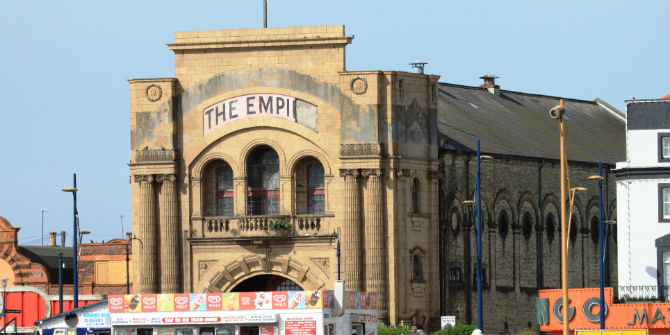 Great Yarmouth voted to leave in 2016 by a majority of 71.5%. The following year Janosch Prinz (University of East Anglia) talked to some of its residents about their disillusionment with the local economy, a lost sense of pride in their community and country and a sense that EU bureaucracy was hampering the UK.
Great Yarmouth voted to leave in 2016 by a majority of 71.5%. The following year Janosch Prinz (University of East Anglia) talked to some of its residents about their disillusionment with the local economy, a lost sense of pride in their community and country and a sense that EU bureaucracy was hampering the UK.
Great Yarmouth, sitting between the North Sea and the Norfolk Broads, boasts an 800-year history as a major fishing port and market town. Since the mid-18th century it has attracted visitors to its beach and seaside attractions. Today, Great Yarmouth has the reputation of a traditional English seaside resort town caught in a decades-long decline, with little prospect for recovery. Several people I spoke to pointed to a single event as the origin of the downturn of its fortunes: when the miners didn’t return for their holidays after the strikes and pit closures of the mid-1980s.

The seafront was relatively busy, as were the areas around the main shopping streets in the city centre. Empty storefronts were not particularly in evidence, and there were a number of well-kept hotels, B&Bs and other businesses. Great Yarmouth is a culturally diverse city. There were a sizable number of shops catering to the Portuguese speaking population, as well as to residents with Greek and South Asian roots, and the faces on the streets were far from monoethnic. But nearly all of the ten people I talked to were at least somewhat worried about the current situation of the city – if not about their own – and hoped for change.
People’s deep frustration with what they viewed as impersonal bureaucracy was tangible. “Those bureaucrats in Brussels” certainly did not understand, nor did those in Westminster or in the city council. Nearly everyone I interviewed felt that local problems, especially poverty and lack of opportunity, were being ignored. People were aware of the limitations of their knowledge but believed their experiences were important.
Interviewees (mis)attributed a lot of their frustration with their local and national government to the EU. This (mis)attribution was expressed in vague terms, with the EU standing in for all things wrong with intangible bureaucracy. The most concrete point, reiterated by several small business owners, was that British people were being taken advantage of by their EU partners: while Brits would abide by EU (over)regulation, elsewhere in the EU these regulations were ignored. One local businessman offered this account:
“When Brussels come up with an idea for legislation, the rest of Europe goes ‘Oh yeah, OK’, and ignores it and pays lip service to it. The British establishment goes “We’ve got to set up a new department, that’s jobs for the boys. We can have a whole department on bananas being straight […]. Whatever crazy idea Brussels comes up with, we just think ‘It’s law, we’ve got to embrace it’, because we are more serious about our laws than the rest of Europe.”
A further concern – which could have been taken out of a UKIP manifesto – was with development aid, which felt to some like ignoring “our poverty” here. Its very existence was believed to undermine self-respect and a sense of community.
Most people I spoke to thought that the “people” who had been ignored meant people like them. When the discussion turned to questions of immigration, it became clear that the notion of ‘the people’ could not be so easily stabilised. Trying to tell good from bad immigrants, people started out by mixing cultural and economic criteria. These abstract considerations often led to excursions into local history, in which people set themselves the task of judging which immigrants had been good originally and when they had turned bad (“It now seems we have got people coming here who do not want to follow our customs. They want to bring their own customs and force it down our throat. They take shop after shop.”) The re-telling of a story of good integration (of Greeks and the first Portuguese) to benefits embezzlement (more recent Portuguese) and “sex crime” hikes (for which South Asian men were blamed) had various iterations.
A related concern was about how the pyramid structure of society had been broken. While in the past those at the top would have spent locally, which kept people in jobs, now those at the top would spend abroad and hire cheap immigrant labourers who would in turn send their money back home. An interviewee said:
“At the post office, I see old age pensioners and immigrants on benefits. They collect their benefits from one window and then they go to the next window and send it home, to Bulgaria, Romania, Portugal. You’ve broken the pyramid, no money is drifting down into the local economy.”
This amalgamation of noblesse oblige, trickle-down-economics and fondness for a hierarchical past was a major trope of the social imagination. While people appeared resigned to the domination of society by the wealthy few, they seemed to hope to return to a time when the rich were aware of their social responsibility and spent locally.
Positive demands focused on restoring the self-respect and pride of their community. Manufacturing was repeatedly flagged as a mechanism for restoring a community’s wealth as well as its pride. One interviewee, a former bouncer, remarked: “We’ve lost the steel, we’ve lost the ships, we‘ve lost the key industries we’ve always had. We need to get pride back to our country.”
In Great Yarmouth, I encountered alienation from a social order driven by the logics of the modern state, including the economic logic of globalisation. Brexit seems to have offered some hope of gaining a renewed sense of (national) pride, for returning to local concerns, and for strengthening community – in short, the hope of restoring meaning and self-respect. Even when probed, people found Brexit-based insecurities about the future either difficult to imagine, given how difficult things already were, or a price worth paying.
This post represents the views of the author and not those of the Brexit blog, nor the LSE.
Janosch Prinz is Leverhulme Early Career Fellow at the University of East Anglia. His research focuses on (radical) realism in political theory and on critical methodologies in political and social thought. He is currently working a radical approach to realism and on the integration of with ethnographic methods into political theory.







This is the most sensitive thoughtful study The feelings of people in Great Yarmouth are echoed here in Thanet. The story of Thanet’s Brexit vote is tied in directly in the fight for Manston Airport which had been sold for housing although it’s status as an airport remains.This status was insisted upon by the local council. Our two Conservative MPs especially Sir Roger Gale have fought fo the airport.Sir Roger is a much liked hard working long standing MP Both MPs won their seats at the general election partly because of their sensible support for Manston Airport with its very long runway, and fast roads connecting it to the motorways of Kent.It should be noted that Nigel farage did not win the only seat he was likely to get . He was also batting for the airport but for his own reasons not for the benifit of Thanet.The bottom line is that the London biased Government has earmarked Manston for a vast sink estate town where those people kicked out of the council estates of London can be housed.. Thanet is poor, with a cash strapped council and we have a water shortage and very little work. so to have London putting pressure for the loss of the airport for it’s own ends is quite disgusting in my opinion.The return of the airport for cargo as well as passenger flights would do wonders for our local economy if it were properly managed . In the past it had been land banked by the very interconected Infratil and Stagecoach with the view to making money from property much to the glee of London who by selling the council estates to property developers would make even more money from investment flats.Stagecoach were keen to diversify into property because government transport subsidy is not what it was. Our MP Sir Roger Gale is a Remain voter but understands the Brexit vote and the value the airport will bring after Brexit.As in Great Yarmouth, people want the dignity of making their own money. Here they do not want to be used to sort London’s problems out.The airport will if modernised attract business here as business people need to fly as does my husband. There is a four hour journey to the London over stretched hellish airports because of the heavy traffic on the M25 even though they are near as the crow flies Manston Airport would encourage a mixed demographic in Thanet and sucessfull cutting edge businesses.Thanet needs it’s sense of dignity just as do the people of GreatYarmouth who would like their fishing waters back.and we the 100 year old airport..
It’s always good to report on what real people think in real communities. So much of the UK has been hurt by the Ponzi scheme of winner take all capitalism and the austerity it brings in its wake.
The great lie is that the EU is mostly or even partly to blame. I believe, that our membership of the EU has ameliorated the worst excesses of our current economic situation. Reflecting on one of the comments quoted about how the UK applies all the rules of the EU while other EU countries ignore them. Actually, there are many rules that UK could have applied, but either ignored or opted out of that would have helped communities such as Great Yarmouth – for example, on EU immigrants.
Brexit in any form will not help Great Yarmouth, and if we crash out with no deal residents there will find that things can indeed get much much worse for them.